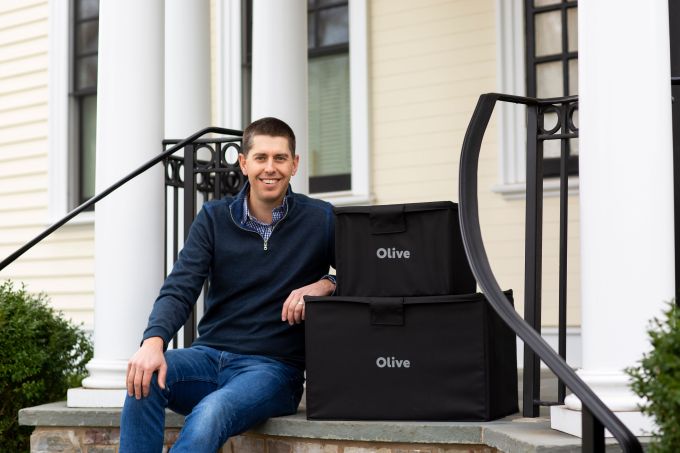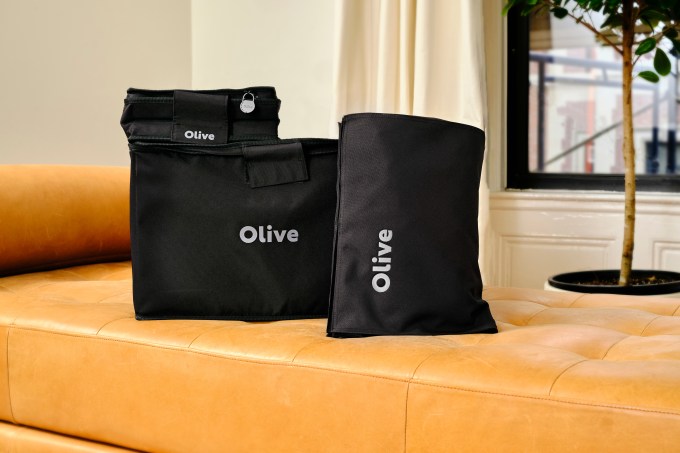Earlier this year, a startup called Olive launched its new shopping site and app with the goal of making e-commerce more efficient, convenient, and sustainable by offering a way for consumers to aggregate their orders from across retailers into single shipments that arrive in reusable packaging, not cardboard. If items need to be returned, those same packages are reused. Otherwise, Olive will return to pick them up. Since its February 2021 debut, the company has grown to include over 100 retailers, predominately in the fashion space. Today, it’s expanding again by adding support for another 25 beauty retailers.
Launch partners on the new effort include brands like Supergoop!, Kora Organics, Pai Skincare, Erno Laszlo, Jecca Blac, Sahajan, Clark’s Botanicals, NuFace, Purlisse, Cover FX, LYS Beauty, SiO Beauty, Peace Out Skincare, Koh Gen Do, Julep Beauty, In Common Beauty, Indie Lee, Glow Recipe, Ursa Major, RMS Beauty, Ceremonia, Sweet Chef, Follain, and BalmLabs.
They join Olive’s numerous apparel and accessory retailers like Adidas, Superga, Rag & Bone, Birdies, Vince, Goop, Khaite, and Veronica Beard, among others.
To support the expansion, Olive also developed a new set of reusable packaging that has protective elements for more damageable items. While before, the company had offered a variety of packages like soft-sided garment bags and various sizes of more rigid containers (see below), it’s now introducing its own alternative to the air bubble strips you’ll find in most Amazon boxes these days. Olive’s version is integrated into its reusable packaging and can be easily deflated by the customer when it’s time to return the package at pickup.

Image Credits: Olive, founder Nate Faust
The idea for Olive is a timely one. Due to the Covid-19 pandemic, e-commerce adoption has soared. But so has consumers’ guilt. Multiple packages land on doorsteps every week, with cardboard and plastic to recycle — if that’s even available in your area. Delivery trucks — Amazon, UPS, FedEx, and others — are now a daily spectacle on every city street. Meanwhile, market leaders like Amazon and Walmart seem largely interested in increasing the speed of delivery, not necessarily the efficiency and sustainability. (Amazon allows shoppers to pick an Amazon Day delivery, for consolidated shipments, but it’s opt-in.)
Olive founder Nate Faust says he was inspired to build the company after realizing how little interest there was from larger e-commerce players in addressing some of the inconveniences and inefficiencies in the market. Faust had previously served as a vice president at Quidsi (which ran Diapers.com and Soap.com and sold to Amazon), then co-founder and COO at Jet, which was acquired by Walmart for $3.3 billion. Before Olive, he was a senior vice president at Walmart.
After some soul searching, he realized he wanted to build something in the e-commerce space that was focused more on the social and environmental impact, not just on driving growth and consumption.

Image Credits: Olive
“I had an epiphany one evening when taking out the trash and recycling,” Faust explains. “It’s pretty crazy that we’re this far into e-commerce and this is the status quo delivery experience — all this waste, which is both an environmental issue and a hassle for consumers,” he says. “And the bigger issue than the packaging is actually the fact that the majority of those packages are delivered one at a time, and those last-mile emissions are actually the biggest contributor of carbon emissions in the post-purchase e-commerce supply chain.”
Consumers may not think about all the issues, because many of them are hidden, but they do struggle in other ways beyond dealing with the waste. Returns are still a hassle — so much so, that Amazon now allows customers to go to Kohl’s where it’s partnered on in-store return kiosks that also help the brick-and-mortar retailer increase their own foot traffic.
Plus, consumers who shop from different sites have to set up online accounts over and over, entering in addresses and payment information many times, which is an annoyance. Olive offers the convenience of an Amazon-like one-stop-shop experience on that front.
Meanwhile, Olive addresses the return issue by allowing consumers to simply place their unwanted items back in Olive’s packaging then leave them on their doorstep or with the building’s doorman for return. It works with both the USPS and a network of local carriers to serve the customers in its current footprint, which is about 100 million U.S. consumers on both coasts.
While customers don’t have to deal with packaging, it hasn’t been entirely eliminated from the equation at this point. Olive today partners with retailers who ship packages to its own west coast and east coast warehouses, where they repackage them into the reusable containers to deliver to customers. Right now, that means Olive is responsible for the recycling issues. But it’s working with its brand partners to have them pack orders directly into the reusable packaging from the start — before shipping to Olive’s consolidation warehouses for delivery. Today, it has a few retailers on board with this effort, but it hopes that will eventually expand to include all partners.
The company generates revenue on an affiliate commission model, which works for now. But over time, it may need to evolve that business model over time, as its customer base and partnerships grow. At present, around 10,000 consumers have used Olive, ahead of any large-scale marketing and customer acquisition efforts on the startup’s part.
For now, New York-based Olive is growing its business by way of a fundraise of around $15 million from investors including Invus, Primary Venture Partners, and SignalFire.
Source Link Sustainable e-commerce startup Olive now ships beauty products, in addition to apparel
Leave a Reply